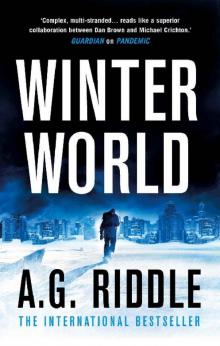- Home
- A. G. Riddle
Pandemic (The Extinction Files Book 1) Page 2
Pandemic (The Extinction Files Book 1) Read online
Page 2
Elim’s hope vanished when the man’s eyelids parted. Yellow, jaundiced eyes stared up at him. Blood pooled at the corner of his left eye, then trickled down the man’s face.
“Get back,” Elim said, spreading his arms out, sweeping the nurses with him.
“What’s the matter with him?” the man’s friend asked.
“Clear the room,” Elim said.
The nurses evacuated immediately, but the young man stood his ground. “I’m not leaving him.”
“You must.”
“I won’t.”
Elim studied the young man. There was something off here. The camera, his demeanor, showing up here of all places.
“What’s your name?”
“Lucas. Turner.”
“Why are you here, Mr. Turner?”
“He’s sick—”
“No, why are you in Kenya? What are you doing here in Mandera?”
“Starting a business.”
“What?”
“CityForge. It’s like crowdfunding for startup city governments,” Lucas said, sounding rehearsed.
Elim shook his head. What’s he talking about?
“You know what’s wrong with him?” Lucas asked.
“Perhaps. You need to leave the room.”
“No way.”
“Listen to me. Your friend has a very dangerous disease. It is likely contagious. You are at great risk.”
“What’s he got?”
“I don’t—”
“You have to have an idea,” Lucas insisted.
Elim glanced around, confirming that the nurses had left the room. “Marburg,” he said quietly. When Lucas showed no reaction, he added, “Possibly Ebola.”
Color drained from Lucas’s sweaty face, making his dark, shaggy hair contrast even more with his his pale skin. He looked at his friend on the table, then trudged out of the room.
Elim walked over to the exam table and said, “I’m going to call for help. I will do everything I can for you, sir.”
He removed his gloves, tossed them in the waste bin, and drew out his smartphone. He took a photo of the rash, asked the man to open his eyes, and snapped another photo, then sent the images to the Kenyan Ministry of Health.
At the door, he instructed the nurse waiting outside to keep anyone but him from entering the room. He returned a few moments later wearing a protective gown, facemask, boot covers, and goggles. He also carried the only treatment he could provide his patient.
On a narrow wooden table in the dingy room, he lined up three plastic buckets. Each bucket had a piece of brown tape with a single word written on it: vomit, feces, urine. In the man’s condition, Elim wasn’t optimistic that he could segregate his exiting bodily fluids, but that was the standard protocol for Ebola and similar diseases, and Elim intended to follow it. Despite having few supplies and little staff, the African doctor was determined to provide the best care he possibly could. It was his duty.
He handed the man a small paper cup filled with pills—antibiotics, to treat any secondary infections—and a bottle labeled ORS: oral rehydration salts.
“Swallow these, please.”
With a shaky hand, the man downed the pills and took a small sip from the bottle. He winced at the taste of the mixture.
“I know. It tastes bad, but you must. You must stay hydrated.”
On average, Ebola killed half of those it infected. Even when the body’s immune system defeated the disease itself, the diarrhea during its acute phase was often fatal due to dehydration.
“I will return soon,” Elim said.
Outside the room, Elim carefully removed his PPE—personal protective equipment. He knew they didn’t have enough PPE in the hospital to protect all the staff who would need to care for the man. They desperately needed more equipment—and help. In the meantime, Elim would have to isolate the sick man and quarantine Lucas long enough to determine if he was infected too.
The middle-aged physician was weighing his next move when the nurse called out once again.
He raced to the hospital’s triage room, where he found yet another westerner, a tall white man, leaning against the door frame. He was older than the other two, but like the other sick man he was pale, sweaty, and smelled of diarrhea and vomit.
“Is he with the others?” Elim asked.
“I don’t know,” the nurse answered. “They sent him from the airport.”
“Sir, please lift your shirt up.”
The tall man lifted his shirt up, revealing a wide rash.
Elim took a photo to email to the Ministry of Health. To the triage nurse he said, “Escort him to Exam Two. Do not touch him. Keep your distance. Leave the room. No one enters.”
He dialed the Kenya Ministry of Health’s Emergency Operation Center. When the line connected, he said, “I’m calling from Mandera Referral Hospital. We have a problem here.”
Chapter 2
He had been beaten up. That was his first thought upon waking. His ribs radiated pain. His legs ached. He reached up and touched the tender knot on the left side of his head and quickly drew his hand away.
He was sprawled out on a king size bed, which was still made up. The morning sun shone through sheer curtains, blinding him and sparking even more pain in his throbbing head.
He shut his eyes and turned away.
A few seconds later, he slowly opened his eyes again. The nightstand held a silver lamp and a small writing pad. The letterhead read: Concord Hotel, Berlin.
He tried to remember checking in, but he couldn’t. And more: he didn’t know what day it was. Or why he was in Berlin. Or his own name, for that matter. What happened to me?
He rose and hobbled to the bathroom. His ribs ached with every step. He pulled the blue button-up shirt from his khaki pants. A bruise covered his left side; it was dark blue and black in the center, flowing to red at the edges.
He examined himself in the mirror. His face was fit and trim, with high cheekbones. Thick blond hair fell to his eyebrows, curling slightly at the ends. He had a faint tan, but from his complexion and smooth hands, it was clear that he worked inside, in a white-collar profession. He searched for the knot on his head. It was large, but the blow hadn’t broken the skin.
He reached in his pockets and found only a thin piece of paper the size of a business card. He drew it out and examined it: a 20% off coupon from Quality Dry Cleaning for Less.
On the back, he—or perhaps someone else—had scribbled three lines of text.
The first:
ZDUQ KHU
The second:
7379623618
And the third line was simply three diamonds inside parentheses.
(<><><>)
A code of some sort.
His head hurt too much for codes.
He laid the card on the vanity, exited the bathroom, and walked through the bedroom into the living area, where he stopped cold. A man lay on the floor. His face was pale and ashy. He wasn’t breathing.
A single white page lay near the dead man, in front of the door to the suite. It was a bill for the stay, which apparently had begun a week before and included several deliveries from room service and nothing from the minibar.
Most importantly, the guest name was printed at the top. Desmond Hughes. He knew at once that this was his name, but seeing it brought no flood of memories, only recognition.
The man on the floor was tall and slender. His hair was gray, thinning, and closely cropped. He wore a dark suit, a white dress shirt, and no tie. A ring of bruises circled his muscular neck.
Desmond knelt next to the body and began to reach into the man’s pants pockets—then stopped, his instincts kicking in. He grabbed the small wastebasket under the desk, pulled out the plastic liner, and covered his hand, ensuring he didn’t leave any fingerprints or DNA.
The man’s pocket held a wallet and a hard plastic employee ID card for Rapture Therapeutics. There was no job title listed on the ID card, just a name: Gunter Thorne. The picture matched the pal
e face lying sideways on the thin carpet. His German ID card and credit cards all showed the same name.
Desmond slid the items back into the man’s pocket and gently pulled the lapel of his suit back, revealing a black handgun in a holster.
Desmond sat back on his haunches, which made his legs ache. He stood, trying to stretch them, and scanned the room. It was pristine. Cleaned recently, no doubt. He searched it, but it was utterly devoid of any clues. There was no luggage, nothing hanging in the closet. The small safe was open and empty. There weren’t even any toiletries.
He checked the bill again. No calls.
What did it all mean? It was as if he had only come here to eat. Or to hide. Did he live in Berlin? If not for Gunter Thorne’s dead body in the living room, Desmond would have already called the front desk to find a reputable urgent care facility. He couldn’t now, not without knowing more. And he had only one clue.
He walked back to the bathroom and picked up the coupon with the sequence of letters and numbers on the back. As he stared at it, he realized something about the parentheses. In financial statements, they indicated a negative number—a loss. A deduction from a running balance.
How did he know that? Was he in finance?
He sat on the bed and took the pad from the side table. What was the key here? Deduction. A loss. Negative.
There were three diamonds inside the parentheses. So negative three—subtract three. Yes—the bottom line had to be the key, the first two lines the message. The name of the code popped into his mind: a simple substitution cipher. And more, it was a Caesar shift cipher, used famously by Julius Caesar for his secret correspondence.
Desmond took each of the letters and subtracted three—so Z became W, and D became A. He did the same with the numbers. That yielded:
WARN HER
4046390385
He placed dashes after the third and sixth numbers, producing:
404-639-0385
Warn her. And a phone number. Warn her of what? Through the opening between the bedroom and living room, he eyed Gunter Thorne’s dead body. Maybe Rapture Therapeutics or whomever had sent Gunter to the hotel room was after “her” as well. Or maybe it was all unrelated. Or maybe, Desmond had set all of this up to trap Gunter here. She could be an accomplice of his somehow. Either way, she might have answers.
Desmond picked up the phone and dialed.
On the third ring, a woman answered, sounding groggy. “Shaw.”
“Hi. It’s… Desmond. Hughes.”
She sounded more alert when she spoke again. “Hi.”
“Hi.” He had no clue where to begin. “Are you… expecting my call?”
She sighed into the receiver. He heard her rustling, sitting up perhaps.
“What is this, Desmond?”
“Do we know each other?”
Her tone was sad now. “This isn’t funny, Des.”
“Look, I just, can you tell me who you are? Where you work? Please.”
A pause.
“Peyton Shaw.”
When he said nothing, she added, “I work at the CDC now. I’m an epidemiologist.”
A knock at the suite’s door rang out—three raps, firm—from the living room.
Desmond waited, thinking. The clock on the table read 7:34 a.m. Too early for maid service.
“Hello?” Peyton said.
Three more knocks, louder this time, followed by a man’s deep voice: “Polizei.”
“Listen to me, Peyton. I think you’re in danger.”
“What? What’re you talking about?”
Three more knocks, insistent, loud enough to wake anyone in the neighboring room. “Polizei! Herr Hughes, bitte öffnen Sie die Tür.”
“I’ll call you back.”
He hung up and sprinted to the door, ignoring the pain in his legs. Through the peephole he saw two uniformed police officers, along with a man in a dark suit—likely hotel security.
The hotel employee was moving a key card toward the door lock.
Chapter 3
In Atlanta, Dr. Peyton Shaw sat up in bed with the cordless phone to her ear. “Desmond?”
The line was dead.
She hung up and waited, expecting Desmond to call back.
It was 1:34 a.m. Saturday night, and she had been home alone, asleep for over three hours. She was wide awake now, though. And unnerved.
She felt the urge to take a look around the two-bedroom condo and make sure there wasn’t someone else inside. She had lived alone since moving to Atlanta in her twenties, and with a few exceptions, she had always felt safe.
She grabbed her cell phone, rose from the platform bed, and cautiously paced out of her bedroom. Every few seconds her bare feet squeaked against the cold hardwood floors. The front door was shut and the deadbolt locked. The door to the second bedroom, which she used as a home office, was also closed, hiding it from the open-concept living room and kitchen. She’d found that pictures of pandemics around the world were a real mood-killer for company and gentleman callers, so she always kept her office door shut.
At the floor-to-ceiling windows in the living room, she peered down at Peachtree Street, which was mostly deserted at this hour. She felt a chill through the glass; it was colder than usual outside for late November.
She waited, still hoping the home phone would ring. She had considered canceling the landline a dozen times, but a few people still had the number, and for reasons she couldn’t fathom, the cable and internet bill actually came out cheaper with the home phone.
She ran a hand through her shoulder-length brown hair. Her mother was half-Chinese, half-German, and they shared the same porcelain skin. She wasn’t quite sure what she’d gotten from her father, who was English, and had died when she was six.
She plopped down on the gray fabric couch and tucked her freezing feet under her bottom, trying to warm them. On her cell phone, she did something she hadn’t done in a long time—something she had sworn she would stop doing: she opened Google and searched for Desmond Hughes. Hearing Desmond’s voice had rattled her. His last words—You’re in danger—still lingered in her mind.
The first hit was the website for Icarus Capital, a venture capital firm. Desmond was listed first on the Our People page as the founder and managing partner. His smile was confident, maybe even bordering on arrogant.
She clicked the Investments page and read the introduction:
It is said that there’s no time like the present. At Icarus Capital, we disagree. We think there’s no time like the future. That’s what we invest in: the future. More specifically, we invest in people who are inventing the future. Here’s a sampling of those people and their companies. If you’re inventing the future, get in touch. We want to help.
Peyton scanned the companies listed: Rapture Therapeutics, Phaethon Genetics, Rendition Games, Cedar Creek Entertainment, Rook Quantum Sciences, Extinction Parks, Labyrinth Reality, CityForge, and Charter Antarctica.
She didn’t recognize any of them.
She clicked the next link in the web search results, which was a video of Desmond at a conference. An interviewer off-camera asked a question: “Icarus has invested in a really eclectic mix of startups, everything from pharma, biotech, virtual reality, grid computing, and even extreme vacationing in places like Antarctica. What’s the thread that ties it all together? For the entrepreneurs out there in the audience, can you tell them what you’re looking for in a startup?”
Sitting in a club chair on stage, Desmond held up the mic and spoke calmly, but with infectious enthusiasm. A slight grin curled at the edges of his mouth. His eyes were focused, unblinking.
“Well, as you say, it’s hard to categorize exactly what kind of company Icarus is looking for. What I can tell you is that each of our investments is part of a larger, coordinated experiment.”
The interviewer raised his eyebrows. “Interesting. What kind of experiment?”
“It’s a scientific experiment—one meant to answer a very important question.”<
br />
“Which is?”
“Why do we exist?”
The moderator feigned shock and turned to the crowd. “Is that all?”
The audience laughed, and Desmond joined in.
Desmond leaned forward in the club chair, glanced at the moderator, then focused on the camera. “Okay, I think it’s fair to say that many of you out there—in the audience and watching this video—would say the answer to that question is simple: we exist because the physical properties of this planet support the emergence of biological life, that we are biologically inevitable because of Earth’s environment. That’s true, but the real question is why? Why does the universe support biological life? To what end? What is humanity’s destiny? I believe there is an answer.”
“Wow. You almost sound like a person of faith.”
“I am. I have absolute faith. I believe there’s a great process at work all around us, a larger picture of which we have only seen a very small sliver.”
“And you think the technology Icarus is funding will deliver this ultimate truth?”
“I’d bet my life on it.”
Peyton had just fallen asleep again when a noise from the bedside table woke her. She froze, listening, but it stopped suddenly.
It came again: something brushing up against the table.
A vibration.
A glow emanated from beyond the lamp, throwing light up at the ceiling.
She exhaled, grabbed her buzzing cell phone, and checked the time—3:35 a.m. She didn’t recognize the number, but she knew the country code. 41. Switzerland.
She answered immediately.
“Peyton, I’m sorry to wake you,” Dr. Jonas Becker said.
The German epidemiologist led a rapid outbreak response team for the World Health Organization. Peyton held a similar job at the Centers for Disease Control. The two epidemiologists had worked together a dozen times in hot zones around the world, and over that time, they had developed a special bond.

 The Atlantis Gene: A Thriller
The Atlantis Gene: A Thriller The Solar War (The Long Winter Book 2)
The Solar War (The Long Winter Book 2) The Extinction Files Box Set
The Extinction Files Box Set The Atlantis Trilogy Box Set- The Complete Series
The Atlantis Trilogy Box Set- The Complete Series Winter World
Winter World Genome
Genome Pandemic (The Extinction Files Book 1)
Pandemic (The Extinction Files Book 1) The Atlantis Gene: A Thriller (The Origin Mystery, Book 1)
The Atlantis Gene: A Thriller (The Origin Mystery, Book 1) Departure
Departure Genome (The Extinction Files Book 2)
Genome (The Extinction Files Book 2) The Atlantis World (The Origin Mystery, Book 3)
The Atlantis World (The Origin Mystery, Book 3) The Atlantis Plague: A Thriller (The Origin Mystery, Book 2)
The Atlantis Plague: A Thriller (The Origin Mystery, Book 2)